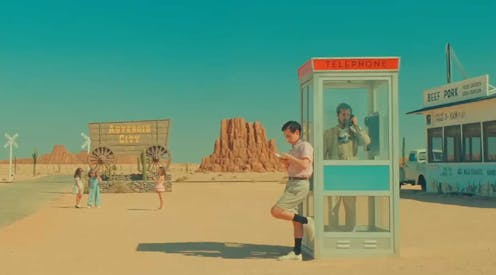
Much has been written on the grief in Wes Anderson’s Asteroid City, with the director himself being candid enough to describe the film not only in terms of grief, but as being centred chiefly around death. Anderson also notes, however, that the concept for the film was how we contend with things outside of our own control.
Set in a fictional desert town in 1950s America, Asteroid City follows a father and his children to a Junior Stargazer convention, only to have the event “spectacularly disrupted by world-changing events.”
Research on the psychological effects of climate change is yet unfolding, but one could argue there is no greater site of collective grief for worldwide societies than the ongoing ecological loss visible to our own eyes. Asteroid City encompasses an environmental grief that manifests as a failure to accept an uncontrollable reality.
Three elements in the film highlight this best: a burnt hand, lucid dreaming and fumbled lines.
Ineffable me
One of the underlying contradictions of the term “anthropocene” is the misleading insinuation of control, when in reality our individual abilities can seem meaningless. It is a similar form of futility that haunts the protagonist of Asteroid City, Augie, who has recently lost his wife.
His place in the world is thrown further into doubt by the arrival of an enigmatic extra-terrestrial, leading the single father to ask searching existential questions. The inability to dismiss his doubts leads the widower to do something important: without reason he burns his hand on a griddle.
Read more: The unfairness of the climate crisis — Podcast
Although Augie has already exhibited self-destructive tendencies in his occupation as a war photographer, and also in the opening scene when he lights his pipe beside a petrol pump, the burning of his own hand perplexes him. And yet all three of these things are linked.
The environmentally damaging retrieval and use of fossil fuels and the sometimes overlooked devastating impact of war on natural ecology are the equivalent of burning all of our hands without reason, and sometimes without even realizing we are doing it. We can equate this lack of awareness with sleep.
Perchance to dream

Asteroid City is a minuscule town in the fictional locality of Arid Plains, a landscape of little else except sand and bleached rock. One thing it does possess, however, is threats.
Aside from the heat and lethal levels of teenage angst, Asteroid City sits adjacent to a nuclear testing site. It is also frequently visited by the sound of gunfire, as police chase a seemingly unending number of gun-toting outlaws. And yet neither of these dangers is afforded a second thought by the film’s characters — they are taken for granted.
While one of this year’s big releases has an atomic explosion as its centrepiece scene, the very real atomic dangers in Asteroid City are fringe events, seen and acknowledged but not processed.
This state of sleepwalking, akin to the cognitive dissonance and unconscious biases associated with the acceptance of climate change at a conscious level, comes to play a large role in the film. The ultimate expression of this is the assertion by one character that “you can’t wake up if you don’t fall asleep.”
While there are a number of interpretations of this line, the call for an ongoing cognizance of our natural surroundings is as apt as any.
Uncertain before the curtain
The central conceit of Asteroid City is of a play within a film, meaning that the actors also play actors. Anderson has said that this helps the fictional cast to process things in their lives that don’t make sense. The strain of this mental effort is evident in awkward delivery and repetition; at one point, silence even takes the place of a line.
While this artistic breakdown exhibits the helplessness that climate change can inflict on people, nothing epitomizes this uncertainty quite like the protagonist’s repeated confession that he does not understand the play. Anxiety about his role in the ongoing “story” leaves part and actor alike frozen, just as the decline of the natural world, so evident it seems inevitable, causes many to freeze in futility.
Landgazing
Does Asteroid City offer hope? While Augie himself struggles with his grieving role, his children seem far more capable of being simultaneously aware and proactive.
The Junior Stargazers are bright enough to alter their future, but can they take their eyes from the heavens and look at their real surroundings? Can they stop inventing weapons and aids to interstellar advertising and do something ecologically beneficial? While the otherness of the alien fascinates them, the only remnant of terrestrial biodiversity — a small bird — is completely ignored by the cast as an unimportant fixture of the barren landscape around them.
Read more: The unfairness of the climate crisis — Podcast
Part way through the film, a military general played by Jeffrey Wright gives a speech in which he tells the Stargazers: “If you wanted to live a nice quiet peaceful life, you picked the wrong time to get born.”
An ongoing acceptance of this fundamental unfairness — and acknowledging the grief, loss and a lack of control at the root of it — may be the first hurdle to tackling climate disaster. We can’t control the past, but we should try to change the future. You don’t need to wake up if you don’t fall asleep.
Chris Corker does not work for, consult, own shares in or receive funding from any company or organisation that would benefit from this article, and has disclosed no relevant affiliations beyond their academic appointment.
This article was originally published on The Conversation. Read the original article.







